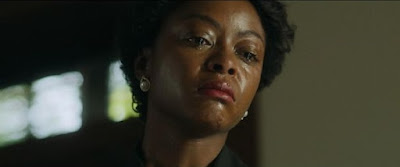or
"Bo, Be Small Down There"
The term "galvanize" is defined as "to subject to the action of an electric current especially for the purpose of stimulating physiologically" or "to stimulate or excite as if by an electric shock."
I bring this up, as Till—the story of the lynching of 14 year old Emmett Till in 1955 and his mother's struggle for justice against the "individuals" that murdered him*— ends with a long list of story updates and the first one is that the murder "galvanized" the civil rights movement leading to the 1957 Civil Right Act.
Sometimes in our world of (now) 8 billion people, the numbers become a little staggering and we tend to lose people in all the statistics. 6,636,235 Jews killed in the Holocaust, 1.07 million killed by Covid, 4,742 dead by lynching (that we know of), 480,000 deaths by smoking, 42,915 traffic deaths in 2021. That's a lot of bodies. But, if you think about just one...just one individual, one life, then maybe...just maybe...the numbers become less staggering and maybe empathy allows one to imagine that one single, solitary life.**
Mamie Till-Bradley (played magnificently in Till by Danielle Deadwyler) didn't know that at the time. All she knew was that she had sent her son to see family in Mississippi, and despite repeated warnings, admonitions and entreaties to "be small down there," the youngster (played by Jalyn Hall), who grew up in Chicago because his Mother "wanted him to be a boy and not have his childhood taken away from him" walked around as if he had possibilities in a place where black hopes went to die.I won't go into the details—you can look them up in the "Emmett Till" link above (and if I recount them it will turn into a frustrated screed), but the movie does an excellent job of staying true to the facts and the intricate details of what happened and the nightmare that Bradley went through when her son disappeared, when his mutilated body was found in the Tallahatchee river, when there was a concerted effort to not return the body to Chicago, her subsequent decision to have an open casket funeral to show the public—and the press—the torture the boy endured, and the subsequent mockery of a trial held in the jurisdiction for the men known all too well to have committed the crime. They were acquitted after an hour of deliberation by the all-white male jury (I remember that one of the jurors said it would have been shorter if they didn't stop for sodas).
But, the nation noticed, even if the Mississippians merely shrugged and said "so what?" The accused men then admitted to the crime for an interview for Look magazine (for which they received $400), as the double jeopardy rule kicked in. One looks at what happened and one can only shake their head at the malignant cock-sure hatred exhibited during the trial, seeing a rampant injustice done at the top of its braying lungs. It makes one want to take action. It does indeed galvanize.
So...how is the movie? Well, with a lot of support from EON Productions (the James Bond people), the movie has a lot going for it. The direction—by Chinonye Chukwu—is fascinating, reminding of the precise machinations of Hitchcock, the camera at that perfect spot to lend a pictorial commentary on what's transpiring on-screen. It doesn't prettify with flattering angles and subtly manipulates without relying on tricks, barely even calling attention to itself. There is one verrrry slow "Vertigo" shot (that's brilliant) and some very subtle CGI work for the purposes of distancing figures from the background. It's old school film-making, but what it's recording is far more heart-rending than anything Hitchcock shot.
And that's in the performances. It's going to be a sad award season if Deadwyler doesn't get any bling for her performance, which is simultaneously raw and calculated. She carries the movie on her shoulders—no small feat—and traverses the many journeys from shock to steely resolve that Till-Bradley must conquer to make just another lynching injustice into a personal crusade. The most precise definition of galvanize is "to coat iron (or steel) with zinc" in order to carry an electric current. Both her performance and the film itself fit all those definitions to a "T".
* Non-Spoiler Spoiler Alert: It happened in Money, Mississippi, so she didn't get it and there wasn't any...justice, I mean.
** This will answer any questions about "why the girl in the red coat?" in Spielberg's Schindler's List.







No comments:
Post a Comment